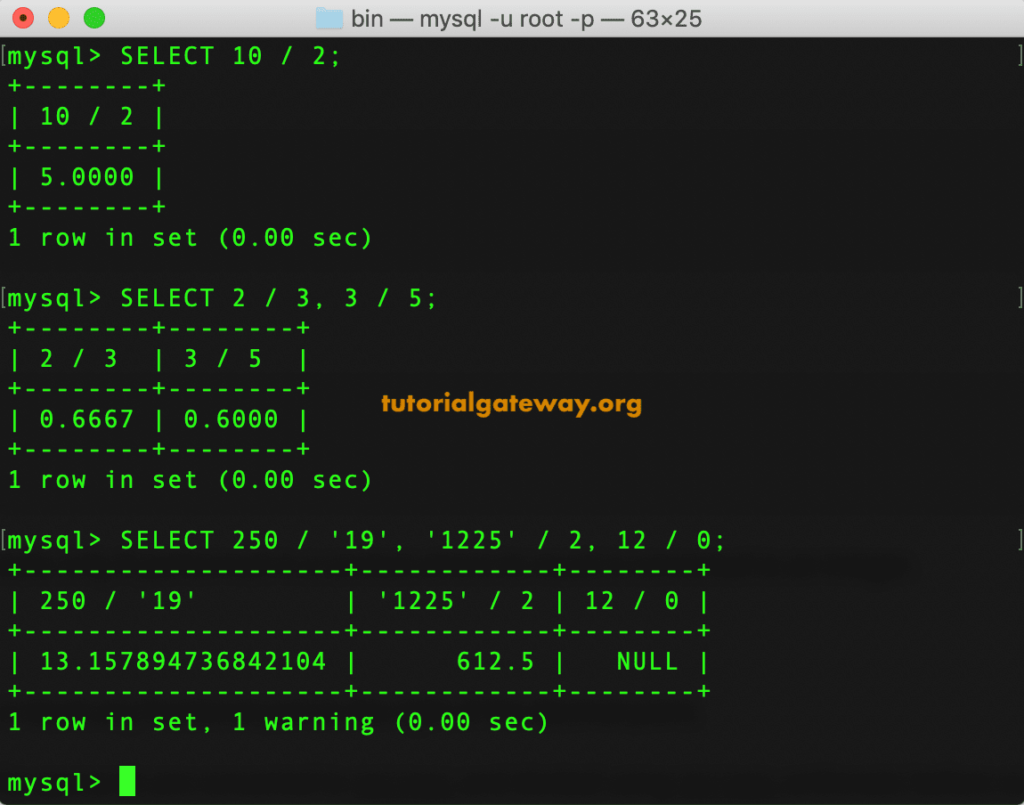
- HOW DO YOU DO DIVISION WITH COLUM VALUES MYSQL HOW TO
- HOW DO YOU DO DIVISION WITH COLUM VALUES MYSQL UPDATE
Otherwise, you may set any desired option for the subpartition or allow it to assume its default setting for that option.

In HASH partitioning MySQL take care of this, The following example explains HASH partitioning better: CREATE TABLE store ( HASH partitioning makes an even distribution of data among predetermined number of partitions, In RANGE and LIST partitioning you must explicitly define the partitioning logic and which partition given column value or set of column values are stored. Student_separated DATE NOT NULL DEFAULT '', You can do it by PARTITION BY LIST (EXPR) where EXPR is the selected column for list partition, We have explained LIST partitioning with example below: CREATE TABLE students ( The difference between RANGE and LIST partitioning is: In LIST partitioning, each partition is grouped on the selected list of values of a specific column. PARTITION p8 VALUES LESS THAN ( UNIX_TIMESTAMP(' 00:00:00') ), PARTITION p7 VALUES LESS THAN ( UNIX_TIMESTAMP(' 00:00:00') ), PARTITION p6 VALUES LESS THAN ( UNIX_TIMESTAMP(' 00:00:00') ), PARTITION p5 VALUES LESS THAN ( UNIX_TIMESTAMP(' 00:00:00') ), PARTITION p4 VALUES LESS THAN ( UNIX_TIMESTAMP(' 00:00:00') ), PARTITION p3 VALUES LESS THAN ( UNIX_TIMESTAMP(' 00:00:00') ), PARTITION p2 VALUES LESS THAN ( UNIX_TIMESTAMP(' 00:00:00') ), PARTITION p1 VALUES LESS THAN ( UNIX_TIMESTAMP(' 00:00:00') ), PARTITION p0 VALUES LESS THAN ( UNIX_TIMESTAMP(' 00:00:00') ), PARTITION BY RANGE ( UNIX_TIMESTAMP(sales_forecast_updated) ) (
HOW DO YOU DO DIVISION WITH COLUM VALUES MYSQL UPDATE
Sales_forecast_updated TIMESTAMP NOT NULL DEFAULT CURRENT_TIMESTAMP ON UPDATE CURRENT_TIMESTAMP Sales_forecast_status VARCHAR(20) NOT NULL, It is also possible to partition a table by RANGE, based on the value of a TIMESTAMP column, using the UNIX_TIMESTAMP() function, as shown in this example: CREATE TABLE sales_forecast (
HOW DO YOU DO DIVISION WITH COLUM VALUES MYSQL HOW TO
In RANGE partitioning you can partition values within a given range, Ranges should be contiguous but not overlapping, usually defined by VALUES LESS THAN operator, The following examples explain how to create and use RANGE partitioning for MySQL performance: CREATE TABLE customer_contract(įor example, let us suppose that you wish to partition based on the year contract ended: CREATE TABLE customer_contract( WHERE col3 > 200 AND col3 SELECT * FROM customer PARTITION (p1) Write a SELECT query benefitting partition pruning: SELECT col1, col2, col3, col4 By restricting the query examination on the selected partitions by matching rows increases the query performance by multiple times compared to the same query on a non partitioned table, This methodology is also called partition pruning (trimming of unwanted partitions), Please find below example of partition pruning: CREATE TABLE tab1 ( The user defined division of data by some rule is known as partition function, In MySQL we partition data by RANGE of values / LIST of values / internal hashing function / linear hashing function.

In very simple terms, different portions of table are stored as separate tables in different location to distribute I/O optimally. MySQL partitioning makes data distribution of individual tables ( typically we recommend partition for large & complex I/O table for performance, scalability and manageability) across multiple files based on partition strategy / rules.


 0 kommentar(er)
0 kommentar(er)
